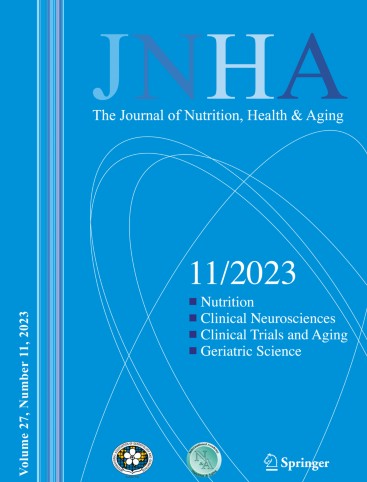膳食炎症指数与心血管疾病和死亡风险:中国社区老年人的前瞻性队列研究
IF 4
3区 医学
Q1 GERIATRICS & GERONTOLOGY
引用次数: 0
摘要
目的:炎症是心血管疾病(CVD)的一个诱因,饮食可以调节炎症。本研究旨在探讨饮食炎症指数(DII)与心血管疾病结局的关系,以及心血管危险因素的中介作用。设计前瞻性队列研究。背景和参与者:2001年至2003年间,香港共有3013名年龄≥65岁、无心血管疾病的中国社区老年人纳入研究。测量方法dii是通过一份包含280个项目的经过验证的食物频率问卷来计算的。CVD结局包括从官方记录中获得的CVD事件、冠心病(CHD)、中风和CVD死亡率。Cox比例风险模型检验了DII分位数与CVD结果之间的关系。中介分析探讨了心血管危险因素的中介作用,包括炎症生物标志物、肾功能受损、踝肱指数异常、肥胖、中枢性肥胖、糖尿病和高血压。结果在5.7年的中位随访中,有263例心血管疾病,147例冠心病,130例脑卒中。在16.8年的中位随访期间,有277例心血管疾病死亡。与最低的五分位数相比,DII最高的五分位数与CVD发病率(HR: 1.43, 95% CI: 1.05-1.96)和CVD死亡率(HR: 1.45, 95% CI: 1.03-2.03)的增加相关。没有发现冠心病和中风有显著关联。肾功能受损、ABI异常和高同型半胱氨酸血症介导了促炎饮食对心血管疾病风险的影响,介导比例从3.68%到7.78%不等。结论促炎饮食增加心血管疾病发病率和死亡率的风险,其介导因素包括肾功能受损、ABI异常和高同型半胱氨酸血症。本文章由计算机程序翻译,如有差异,请以英文原文为准。
Dietary inflammatory index and the risk of cardiovascular disease and mortality: A prospective cohort study of Chinese community-dwelling older adults
Objectives
Inflammation is a contributory factor for cardiovascular disease (CVD), and diet can modulate inflammation. This study aimed to investigate the association between dietary inflammatory index (DII) and CVD outcomes, and the mediating roles of cardiovascular risk factors.
Design
A prospective cohort study.
Setting and participants
A total of 3,013 Chinese community-dwelling older adults aged ≥65 years without CVD were included between 2001 and 2003 in Hong Kong.
Measurements
DII was calculated using a 280-item validated food frequency questionnaire. CVD outcomes included incident CVD, coronary heart disease (CHD), stroke, and CVD mortality, which were obtained from official records. Cox proportional hazards models examined the association between tertiles of DII and CVD outcomes. Mediation analysis explored the mediating roles of cardiovascular risk factors, including inflammatory biomarkers, impaired renal function, abnormal ankle-brachial index (ABI), obesity, central obesity, diabetes mellitus, and hypertension.
Results
There were 263 CVD cases, 147 CHD cases, and 130 strokes during a median follow-up of 5.7 years. There were 277 CVD deaths during a median follow-up of 16.8 years. The highest tertile of DII was associated with increased risks of CVD incidence (HR: 1.43, 95% CI: 1.05–1.96) and CVD mortality (HR: 1.45, 95% CI: 1.03–2.03) compared with the lowest tertile. No significant associations were found for CHD and stroke. Impaired renal function, abnormal ABI, and hyperhomocysteinemia mediated the effects of a pro-inflammatory diet on CVD risk, with mediated proportions ranging from 3.68% to 7.78%.
Conclusion
A pro-inflammatory diet increased the risks of CVD incidence and mortality, mediated by impaired renal function, abnormal ABI, and hyperhomocysteinemia.
求助全文
通过发布文献求助,成功后即可免费获取论文全文。
去求助
来源期刊
CiteScore
7.80
自引率
3.40%
发文量
136
审稿时长
4-8 weeks
期刊介绍:
There is increasing scientific and clinical interest in the interactions of nutrition and health as part of the aging process. This interest is due to the important role that nutrition plays throughout the life span. This role affects the growth and development of the body during childhood, affects the risk of acute and chronic diseases, the maintenance of physiological processes and the biological process of aging. A major aim of "The Journal of Nutrition, Health & Aging" is to contribute to the improvement of knowledge regarding the relationships between nutrition and the aging process from birth to old age.

 求助内容:
求助内容: 应助结果提醒方式:
应助结果提醒方式:


